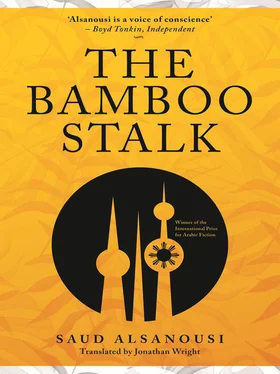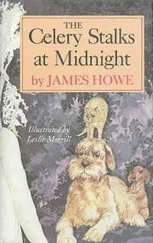Despite all the clutter in the sitting room, it was the drawer that interested me most. The pictures of my father that I had in my briefcase didn’t seem to be enough. I kept myself busy watching the English-speaking channels on television. There was nothing in Ghassan’s flat to help me kill time other than the television. I looked out of the window from time to time but I didn’t see anything outside that would encourage me to go out.
* * *
I couldn’t walk down the street in Kuwait without noticing the cars. For an ordinary Filipino the cheapest, most basic car you could find in Kuwait would be like an impossible dream. The same with the houses. The smallest of them would be considered a mansion in the parts of town where I grew up.
The weather was so cold that for the first time in my life I could see my breath condensing in the air. I shivered as I walked the streets and watched the air I breathed out turn to mist. I had the strange feeling of being in a new climate, in a winter unlike the winters I had known in the past.
One day as I was walking along some backstreet, a car pulled up against the pavement and a man wearing traditional dress and headgear got out. He waved his identity card in my face. It was similar to the one I had. ‘Police,’ he said.
I was caught off guard and tongue-tied. The man continued angrily. ‘Show me your identity papers,’ he said.
I put my hand in the back pocket of my trousers and took out my wallet. He took it out of my hand before I had a chance to get the identity card out for him. I stood still and watched him. He began to look through it. He pulled out the ten dinars Ghassan had given me and put them in his pocket. He threw the wallet in my face without looking at my identity card, got in his car and drove off at speed. I stood there, unsure what to do, with the wallet at my feet. If the police are thieves, what do the thieves do, I wondered.
A policeman? Without a police car or even a police uniform! I didn’t understand anything.
4
After dinner one evening, I said to Ghassan, ‘I’ve never seen you playing the musical instrument, the one my mother told me about.’
He looked at my face in surprise. ‘Do you mean the oud?’ he asked.
‘Yes,’ I said. He was silent for a while, as if thinking about something. He went out of the sitting room for a few minutes, then came back with the oud in a black leather cover that was the same shape as the instrument. In his other hand he held a damp cloth.
Ghassan sat cross-legged on the ground, with his back against the sofa behind him. Without thinking I slipped off the sofa and sat on the ground like him. With the damp cloth, he started removing the dust that had gathered on the leather cover. As he worked, he said, ‘Josephine seems to have told you everything.’
Ghassan put the instrument on his legs without taking it out of the cover.
‘You know, Isa,’ he began, with a sad look on his face. ‘The last time I played this instrument was during our activities under the occupation.’
‘I thought you resisted the Iraqi army with weapons!’ I said disapprovingly.
‘Each of us resisted in his own way. Everyone had his weapon.’
While my father joined the Abu al-Fuhoud group, along with Ismail al-Kuwaiti and others, Ghassan was resisting the Iraqis elsewhere, using a different approach. He was writing patriotic poems and setting them to music, then recording them for distribution to the public, with the aim of inspiring people with the will to resist. Ghassan soon stopping doing that and started working with Abu Faris, who was writing a patriotic operetta that became known as al-Sumoud ( Steadfastness ). Ghassan sang in the chorus with other young men from the resistance. He also helped distribute the operetta in the form of cassettes, which were widely circulated during the Iraqi occupation.
Ghassan said that after the secret meetings where they rehearsed for the patriotic choral work, far from the eyes of the Iraqi forces, he no longer had any desire to play the oud, especially after Abu Faris and the man who wrote the music for the operetta were captured by the Iraqis.
Ghassan took the oud out of the leather cover. The colour and shine of the wood made it look new, untouched. He picked up the small piece of plastic and strummed the strings. He smiled at me. I prepared to hear him play. He reached out to the keys to tune the strings. He turned one of the keys and plucked the string to test the pitch. Suddenly the string snapped.
‘See? Even the strings refuse to play,’ he said, putting the oud back in its cover.
Ghassan went to his bedroom while I stayed in the sitting room. I kept thinking about the drawer that held the pictures of my father, but at first I was hesitant to open it. I didn’t hesitate for long. I sat in the chair at the desk and gently pulled it open.
There were dozens of photographs from different periods of his life. Pictures of him with a thin moustache, others with a thick moustache. Pictures of him wearing glasses and others of him without. If he had looked sad in the pictures, the fact of his death would have had less impact, but in all the pictures he looked so happy that it brought a lump to my throat to think he had died so young. Every picture showed that my father had been full of life. There was a picture of him in the beach house with a large fish hanging from one raised arm, and his other arm bent to show off his biceps, as if to say, ‘It was me who caught it.’ Walid was standing next to him, with his arm raised high too, but with a fish only the size of a finger, and with his other arm bent like my father’s. There was another picture taken in London, with my father standing under Big Ben in a smart grey suit and a dark red tie, next to a woman who appeared to be Kuwaiti, wearing a long brown coat, a short checked skirt, knee-length boots and an elegant hat that made her look like an English princess. There was another picture of him and Walid in Thailand, wearing short-sleeved shirts. My father was bowing, his hands folded, in the traditional Thai greeting, as was a young woman standing beside him. Walid was behind them, sticking out his tongue as always and making V-signs with two fingers of each hand behind their heads. It looked like a peace sign but that definitely wasn’t what Walid meant. There was a picture of my father with Ghassan, with Ghassan in goalkeeper’s kit and my father standing with a ball between his feet. He had such long hair that he looked like a tree. He was wearing black shorts and a yellow T-shirt with the number nine. Ghassan told me later that was the number of my father’s favourite player. There was another picture in which my father appeared with his head shaved and a piece of white cloth wrapped around his body, baring his right shoulder and part of his chest. In the corner of the same
picture Walid is wearing the same type of cloth, submitting to a man who is shaving his head with a razor. In one picture I couldn’t easily make out my father. He had a long beard and was wearing a white gown and the traditional headdress any old how without the black headband. I later found out that it was taken during the occupation and was the last picture taken of my father.
Could I say that I grew to like him, just by looking at the pictures of him? No, my feelings went beyond that. I didn’t just feel affection for him. I loved him, and longed for him and missed him, though I had never seen him. I felt a strong desire to hug him and hear his voice. I often cried to myself and realised for the first time that never in my life had I called anyone papa.
I understood why Mendoza, under the influence of tuba , used to repeat, ‘I’m alone. I’m weak.’ I’m just like you, Mendoza, and without any tuba I admit it. I’m alone. I’m weak.
Читать дальше












